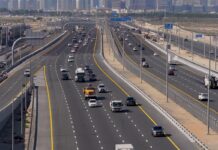Source: www.rta.ae
Engineer Maitha bin Udai, CEO of the Traffic and Roads Agency at Roads & Transport Authority (RTA), stated that last December the Agency awarded a contract to an international consultant to upgrade and improve the performance of traffic signals, virtual messaging signs, and the Traffic Control Center in the Emirate.
 Maitha pointed out that studies conducted on the roads network performance during 2010, which included traffic surveys and analyses of hundreds of locations throughout the Emirate, revealed that internal and collector roads and traffic overlapping zones provided a good level of service while freeways provided an acceptable level of service. “As for traffic signals the findings as a whole they are very good compared to the case in the developed countries where the traffic congestion at traffic signals is a common practice. However, in keeping with its vision aimed at providing safe and smooth transport for all, RTA is consistently endeavoring to increase the points of strengths and reduce weaknesses. In this context an international consultant has been commissioned to study the existing situation with regard to traffic signals and the Traffic Control Center with a view to identifying alternatives for further development and improvement”, she explained.
Maitha pointed out that studies conducted on the roads network performance during 2010, which included traffic surveys and analyses of hundreds of locations throughout the Emirate, revealed that internal and collector roads and traffic overlapping zones provided a good level of service while freeways provided an acceptable level of service. “As for traffic signals the findings as a whole they are very good compared to the case in the developed countries where the traffic congestion at traffic signals is a common practice. However, in keeping with its vision aimed at providing safe and smooth transport for all, RTA is consistently endeavoring to increase the points of strengths and reduce weaknesses. In this context an international consultant has been commissioned to study the existing situation with regard to traffic signals and the Traffic Control Center with a view to identifying alternatives for further development and improvement”, she explained.
Engineer Maitha added: “Phase I of the project provides for the consultant to conduct a comprehensive assessment of the current situation, including the SCOT system which controls more than half of the traffic signals in the Emirate. The consultant will also evaluate the performance of Falcon system which controls the traffic surveillance cameras and virtual messaging signs on the freeways and arterial roads.
“Phase II of the project includes reviewing the best international practices and drawing up general policies for light signals befitting the typical nature of Dubai Emirate. The Consultant’s recommendations will include dozens of policies to be implemented by the Intelligent Traffic Systems Dep’t in the future such as the number of times the timing of the traffic signals is revised in a year, whether RTA to continue to maintain the traffic signals connected to each other across entire zones or provide green waves to specific axes, and whether to apply a different sequence for traffic movements during different peak hours, or adopt the same sequence throughout daytime.
“Phase III of the project requires the Consultant to submit recommendations for further improvement. These recommendations include revising the organizational structure of traffic control centers, preparing new performance processes, manuals and indicators, developing training courses for engineers and operators, and defining the proposed modifications to the Traffic Control Center, including hardware and software. RTA’s Traffic Control Center is one of the most advanced centers of its kind in the Middle East, comprising giant screens displaying traffic accidents and congestions throughout the Emirate using hi-tech electronic traffic systems and software.
“In Phase IV, the Emirate will be divided into several areas where all traffic signals will be connected to each other in each area. Several connection alternatives will be tested and evaluated in conjunction with the current method of connection based on the SCOT system. This phase will also include modifications of the frequencies and timings of the traffic signals.
“In Phase IV RTA’s engineers and operators will be provided with theoretical and practical training besides being offered exposure to work side by side with the Consultant to ensure the optimum transfer of expertise to the RTA.
“The last Phase of the project involves evaluating the modifications put in place and concluding findings and lessons to count on for continuous development and improvement,” said engineer Maitha bin Udai in a final remark.


















